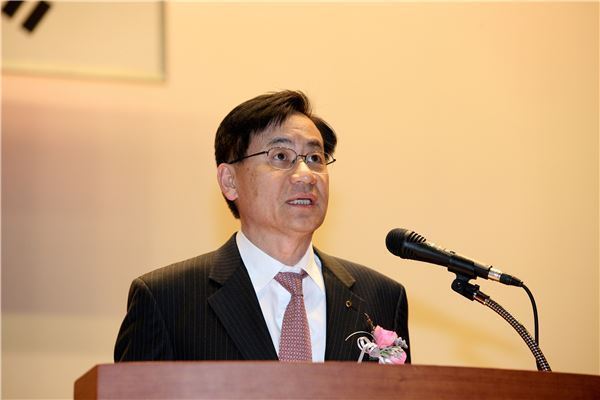Seoul searching for replacement of disgraced AIIB vice president
By 김지현Published : June 29, 2016 - 18:01
[THE INVESTOR] The government is looking for a replacement for Hong Kyttack, vice president of the Asian Infrastructure Investment Bank, who has abruptly taken leave from the Beijing-based institution.
Hong asked for a six-month leave, and has already left China, according to sources close to the matter on June 29.
He made the decision over a scandal that erupted here in Korea over his past questionable actions as the head of state-run Korea Development Bank.
“It seems clear that we need to look for someone new,” said an official of Seoul’s Finance Ministry.
Hong asked for a six-month leave, and has already left China, according to sources close to the matter on June 29.
He made the decision over a scandal that erupted here in Korea over his past questionable actions as the head of state-run Korea Development Bank.
“It seems clear that we need to look for someone new,” said an official of Seoul’s Finance Ministry.

Earlier today, Finance Minister Yoo Il-ho had said Korea hopes to field a candidate for Hong’s replacement.
Hong had been absent at the regional bank’s maiden general meeting in Beijing on June 25, of finance ministers of most of its 57 member states, including Korea’s Yoo.
Hong was elected as one of the AIIB’s five vice presidents and chief risk officer four months ago. His term was three years.
AIIB, envisioned by China as a rival to the US-led World Bank and Asia Development Bank, was officially launched in January this year. Hong taking leave at this point of time is widely seen as a precursor to resignation.
Korea earned the AIIB vice presidency after a $3.7 billion contribution to its $100 billion initial paid-in capital, to be paid over the next five years. Korea has the fifth largest stake -- 3.81 percent -- in AIIB, after China, India, Russia and Germany.
In a revealing interview earlier this month, Hong raised the issue of KDB’s alleged mismanagement of subsidiary Daewoo Shipbuilding & Marine Engineering while he was the bank CEO.
He had complained that key decisions, particularly those concerning bailouts of large companies like DSME, came from higher above. “Presidential aides and top government officials were the real decision makers,” Hong had said.
DSME, Korea’s second-largest shipbuilder, became a subsidiary of KDB in 2000, as a result of a near 2 trillion won (US$1.73 billion) state bailout. KDB, along with the Export-Import Bank of Korea, injected fresh funds of 4.2 trillion won into the shipbuilder when it reported a record loss in 2015.
A recent governmental audit has found that the company cooked its books to hide losses in an accounting fraud amount to over 5 trillion won, while KDB failed to check the shipbuilder’s finances.
Public prosecutors investigating the allegations are seeking an arrest warrant for Nam Sang-tae, the detained former CEO of DSME.
“It (providing new funds to DSME) was decided by Cheong Wa Dae, the Finance Ministry and the financial authorities. KDB had no say in it,” Hong said in the interview. The decision was made at unofficial meetings held by top economic and financial officials at the western auxiliary building of Cheong Wa Dae, he revealed.
The remarks stirred controversy over the opaque way Korea’s economy is being run. The so-called “western auxiliary building meetings” date back to the Asian financial crisis in late 90s, local media reported. No official record has been kept on the meetings as to when they were held, who attended and what was discussed.
Hong ran KDB from 2013 until February this year, before joining AIIB. Prior to that, he taught economics at Chung Ang University in Seoul after earning a Ph.D. in economics from Stanford University in the U.S.
By Lee Sun-young (milaya@heraldcorp.com)


![[Exclusive] Korean military set to ban iPhones over 'security' concerns](http://res.heraldm.com/phpwas/restmb_idxmake.php?idx=644&simg=/content/image/2024/04/23/20240423050599_0.jpg&u=20240423183955)

![[Graphic News] 77% of young Koreans still financially dependent](http://res.heraldm.com/phpwas/restmb_idxmake.php?idx=644&simg=/content/image/2024/04/22/20240422050762_0.gif&u=)



![[Pressure points] Leggings in public: Fashion statement or social faux pas?](http://res.heraldm.com/phpwas/restmb_idxmake.php?idx=644&simg=/content/image/2024/04/23/20240423050669_0.jpg&u=)









